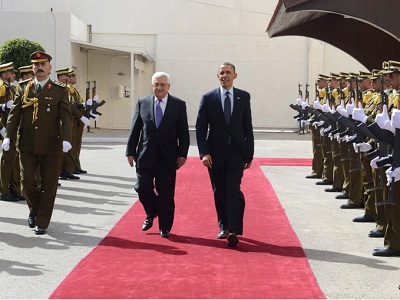After Obama’s Israel Visit: What’s Left for Palestinians?

The divided Palestinian leadership would have to face up to the inescapable reality .. (Photo: WAFA)
By Ramzy Baroud
‘Obama didn’t accomplish much of substance,’ is how Dana Milbank characterized US President Barack Obama’s 3-day visit to Israel and the Middle East.
In an opinion piece in the Washington Post on March 22, Milbank outlined ‘substance’ as “obvious progress toward talks with the Palestinians (..) new ground in deterring Iran’s nuclear program (and) Syria’s chemical weapons.”
True to form, substantive US policy, according to conventional US media wisdom, would always have to reflect Israeli priorities. In practical terms however, even the “obvious progress towards talks with the Palestinians” is worthless. The US-styled ‘peace process’ has proven as costly as any war of conquest.
According to the Foundation for Middle East Peace, citing Israel’s Central Bureau of Statistics, the total number of illegal Jewish population in the occupied Palestinian territories has increased from 281,800 in 1993 (when the Oslo Accords were signed) to 534,224 in 2010. Considering the construction frenzy underway, the number is now significantly higher. The expansion of the settlements, thus the theft of Palestinian land, has grown at an even higher ratio. However, with no serious pressure placed on the Israeli government and with total and unconditional US backing, the Israeli government is able to uphold a curious equilibrium, where it extends one hand for peace, while with the other, enriches its military occupation and colonial enterprise throughout the West Bank and East Jerusalem.
‘Substance’ for Palestinians, would mean something entirely different. The least of their expectations would be for the US to end its funding of the Israeli occupation, or even condition its massive support at Israel’s respect for international and humanitarian laws. Those familiar with US policies in the Middle East, would of course chuckle at such wishful thinking. Those who long insisted that Obama was somehow different from his predecessors must now face unpleasant realities. Obama was no different than the rest. He never had been.
“Obama, He Had Us at Shalom,” was the title of an article by Kerb Keinon at the rightwing Israeli daily the Jerusalem Post. The mood in much of the Israeli media was that of giddiness and warmth. The prospects for Israel to get exactly what it wants are greater than ever. But to pretend that Obama’s visit – his first trip to Israel as a president – was momentous is inaccurate media hype. His unconditional support for Israel has been tedious and redundant, predictable even. Those who have followed his unswerving pro-Israel legacy – including his visit to Israel as a presidential candidate in 2008, his talks before the Israeli lobby group AIPAC and many other examples – could barely discern a shift, except perhaps, in the total disinterest in political sensibility and balance.
He truly delivered in Israel. This was to the total satisfaction of the Israeli Prime Minister and his pro-settler government which was assembled shortly before Obama’s arrival. Obama spoke as if he were entirely oblivious to the political shift to the extreme right underway in Israel. Indeed, the new Israeli government is more right-wing than ever before. The extremist Jewish Home party has three important ministries, including Jerusalem and Housing and the ultra-nationalists of Yisraeli Beiteinu have been awarded the tourism ministry. It means that the next few years will be a settlement construction bonanza, ‘ethnic cleaning’ and greater Apartheid.
“It’s good to be back in The Land (Israel),” Obama said in Hebrew, at the Tel Aviv airport. “The United States is proud to stand with you as your strongest ally and your greatest friend.”
Expectedly, Netanyahu was gloating. Not only did he assemble a government that will cater mostly to extremist Jewish settlers in the West Bank, but he has masterfully managed to humble the US president, or at least quash his ambitions that the US is capable of operating independently in the Middle East, without Israeli consent or interests in mind.
Now that Jewish colonies are flourishing – with occupied East Jerusalem area EI being another major exploit – Netanyahu is once more aspiring for a war against Iran, one that would not be possible without US funding, support and likely direct involvement. “Thank you for standing by Israel at this time of historic change in the Middle East,” Netanyahu said while standing near the mostly US-funded Iron Dome. “Thank you for unequivocally affirming Israel’s sovereign right to defend itself, by itself against any threat.”
In a joint press conference in Ramallah, alongside Palestinian Authority President Mahmoud Abbas, Obama even demanded Palestinians drop their condition (proposed by Obama himself) of a settlement freeze in order to return to the so-called peace talks. “That’s not to say settlements aren’t important, that’s to say if we resolve the (main) problems, then settlements will be resolved,” he said. “If to begin the conversation we have to get everything right from the outset … then we’re never going to get to the broader issue,” Obama added. The broader issue, according to the US president is “how do you structure a state of Palestine,” which Obama voted against last year, and passionately so.
Aside from resounding rhetoric about peace, Obama is finally towing the Israeli line exactly as Netanyahu and the lobby would expect of him, or of any other US president. He has little to offer Palestinians and Arab nations, but much to expect from them. Arab states must seek normalized relations with Israel, and Palestinians must “recognize that Israel will be a Jewish state, and that Israelis have the right to insist upon their security,” he lectured in Jerusalem on the second day of his trip, reported CNN online. The obvious danger here lies in the fact that Israel oftentimes conflates ‘security’ with occupation or by inflicting or supporting wars against other nations – Lebanon, Iraq and now Iran.
Obama will eventually get back to his Oval Office desk, ready to resume work as usual. This will include the signing of many papers concerning additional funds, loans, military technology transfers and much more for Israel. Palestinians meanwhile will carry on with their long fight for freedom. Their divided leadership would have to face up to the inescapable reality: neither Abbas’ quisling government in Ramallah, nor Hamas’ slogan-filled politics in Gaza is likely to change or even challenge a dreadful reality that is maintained exclusively by Israeli bulldozers and American funds.
Palestinians can indeed spend the next few years bickering over who is derailing ‘unity’ between the Hamas and Fatah factions, blaming Obama’s failure to pressure Israel and habitually calling for Arabs to come to the rescue. Or they could, as they should, face up to the fact that time is running out for any of their collective aspirations to be realized. Palestinian leaders, media, intellectuals and all segments of society at home and in the diaspora must overcome their pitiful and often egotistical disagreements and move forward with a united strategy that harnesses the massive support Palestine has acquired over the years, throughout the Middle East and the rest of the world. Their challenge is not in finding a strategy, but agreeing on the need for one.
If Palestinians resisted as one unified body and responded to Obama’s decided pro-Israeli agenda at the start of his second term by tearing down their factional, political and ideological divides, they could indeed make the US president’s visit to Israel and Palestine, in some unintended way, truly ‘historic.’
– Ramzy Baroud (www.ramzybaroud.net) is an internationally-syndicated columnist and the editor of PalestineChronicle.com. His latest book is: My Father was A Freedom Fighter: Gaza’s Untold Story (Pluto Press).










































0 Comments